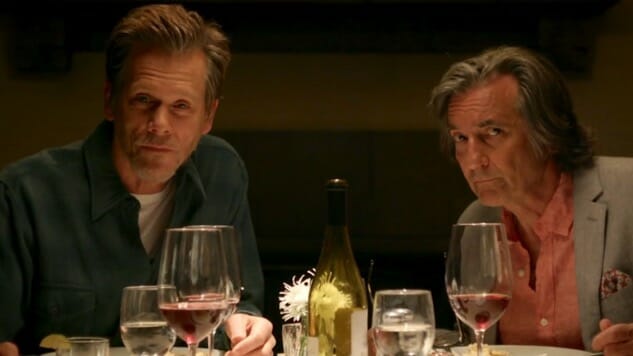No, It’s About a Woman: I Love Dick Successfully Neuters the Male Gaze

It’s true that Jill Soloway has done a very strange and bold thing, in attempting to adapt one of the least adaptable books of all time, Chris Kraus’ I Love Dick. Part memoir, part fiction, part feminist theory—but all love (after all, every letter is a love letter)—I began reading the book after learning that Soloway was turning it into a TV show for Amazon, and wondered how in the world she’d pull it off.
Suffice it to say, it’s been pulled—at least it has been in the pilot, which Amazon premiered earlier this week. There are many reasons for the episode’s success, including Sarah Gubbin’s script (which pulls off that sad/sexy/absurd blend we Transparent fans have come to adore), beautiful, risky directorial moves from Soloway, and pitch perfect performances from Kevin Bacon (Dick), Griffin Dunne (Sylvere) and the incomparable Kathryn Hahn (Chris). In the pilot, New Yorkers Chris and Sylvere find themselves in the strange new land of Marfa, Texas, where Chris struggles to adjust to her role as the wife of Sylvere (or “Dick’s new fellow’s wife,”) and also receives devastating news about her latest film.
I Love Dick, the book, is technically about a woman obsessed with a man who has little to no use for her, except that Chris Kraus takes her “position” and builds theory out of it, or rather, teases out the theory already there. She loves Dick, she uses Dick, she veils and unveils herself through Dick. It’s not about Dick, we discover very early on (nor is it about her husband, Sylvere); it’s about a woman and an artist on a journey, and how the specifics of her white, Jewish, artist woman-ness inform her art, her sex and her interpretation of the art and sex of others.
It’s about plenty of other things as well, and it’s impressive that so much of this is captured in the pilot. In seemingly small and separate moments, two women characters define the series (or the potential series) perfectly, and in doing so, work to nullify or neuter the male gaze.

The first moment occurs near the end of the pilot. Dick shocks and offends Chris at dinner when he defends the musicians who demanded money for the use of their song in her film, and suggests that it was rightfully pulled from the Venice Film Festival. Then, with a smirk, he asks her what the film is about.
-

-

-

-

-

-

-

-

-

-

-

-

-

-

-

-

-

-

-

-

-

-

-

-

-

-

-

-

-

-

-

-

-

-

-

-

-

-

-

-








































